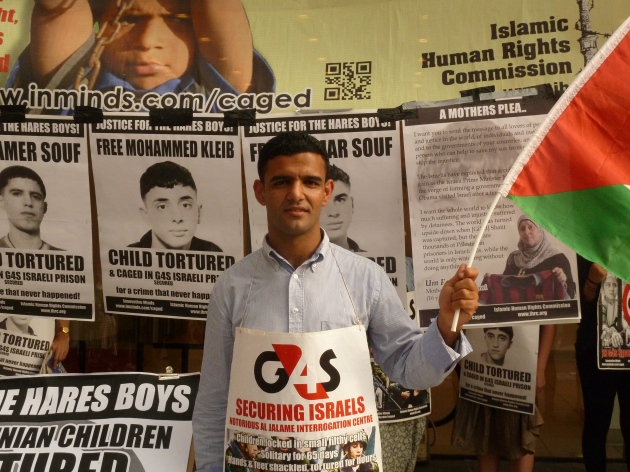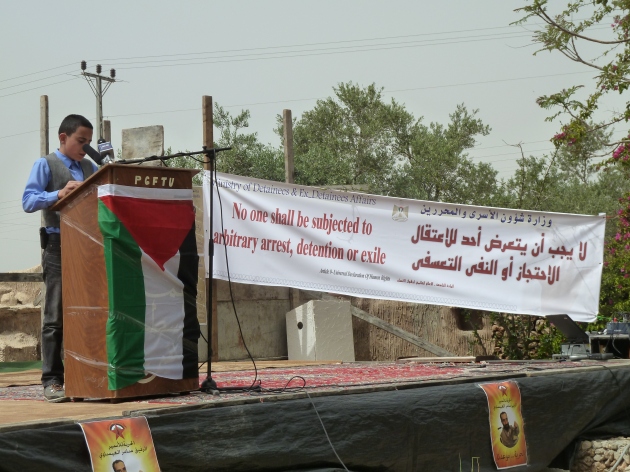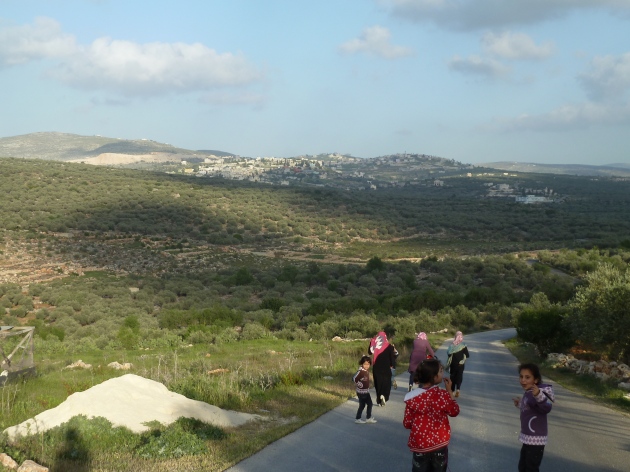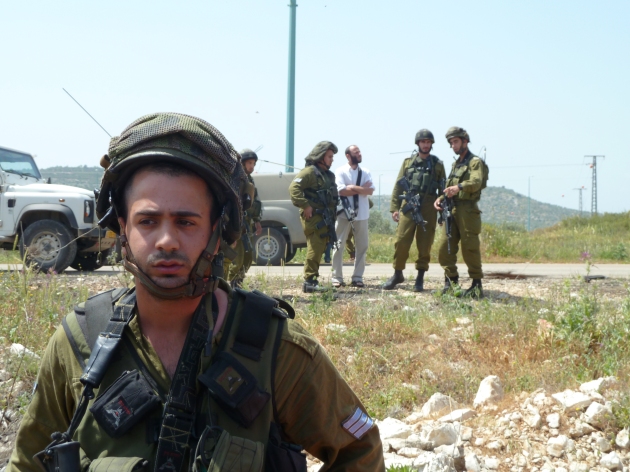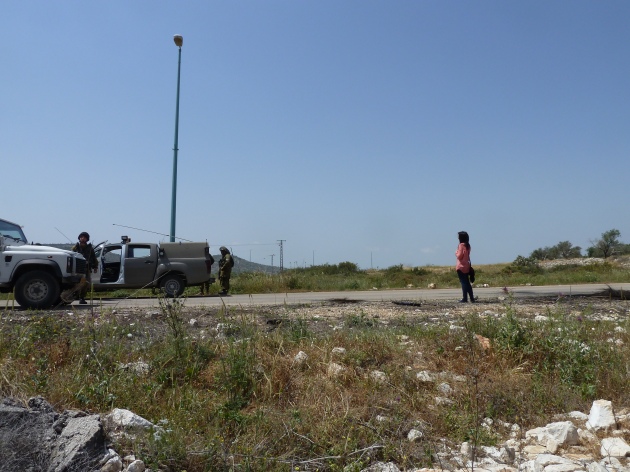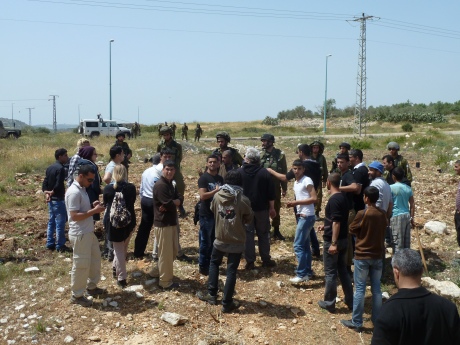The day before I arrived here, a nasty car accident happened not far from the village. An Israeli settler was travelling between settlements when her car crashed into a stationary truck, leaving her small daughter critically injured. The facts of what happened are unclear, but the crash was quickly blamed on local Palestinian youths throwing stones and was soon being reported in the Israeli media as a terror attack. In the week that followed, Palestinian stone-throwing became a hot topic and politicians began to call for a change of the ‘rules of engagement’ to allow the Israeli army to use live ammunition against Palestinian youths throwing stones.
The army began a series of night raids in the Palestinian villages of Hares and Kifl Hares, next to Deir Istiya where IWPS is based, in which 13 Palestinian teenagers were taken away from their homes and sent for interrogation. One of these was Ali, the youngest son of Um and Abu Fadi, close friends of IWPS. Shortly after his ‘arrest,’ two members of the team went to visit and found his mother, Um Fadi, unable to stop crying. I met them a week later. They are an older couple, softly spoken, with good English. Ali is the baby of the family, and his absence leaves a big gap.
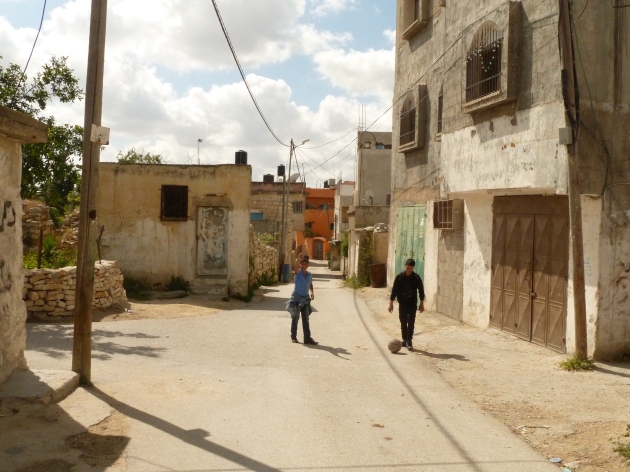
Hares village
The youths were gradually released, after being held without charge for varying lengths of time, until only 5 were left in detention, including Ali. One, who was released after two days, was hospitalised following a beating he received in jail. We interviewed one 16 year old after his release. He told us that around 20 soldiers came to his family house at night and ordered all the family to assemble downstairs. They asked for him by name, blindfolded him and took him away in a jeep. He told us that the soldiers asked him about stone-throwing but didn’t give him a formal reason for his arrest. His family told us that they didn’t know where he had been taken until the army called, two days after he was taken away.
He told us that he was kept in solitary confinement for the first two days of his six-day detention, in a room in which the lights were kept on continuously. He was interrogated every two days by soldiers who shouted at him and threatened to hit him and to harm his mother and sister. He was eventually released, but told us he was jumpy and afraid to go out of the house.
The story continued to make headlines in the Israeli media, as the child, whose name is Adelle and is aged 2-3, remained in a serious condition. Media reports of the attack have been hugely inconsistent; early reports quoted the truck driver as saying that he pulled over thinking he had a flat tyre, realised the the car had crashed into the back of his truck, then noticed the stones on the ground and decided that the noise must have been due to stone-throwing. Later reports said that both vehicles had come under ‘a barrage’ of stones, while others reported that the car had crashed after a rock was ‘hurled through it’s windscreen.’
After 10 days or so we read that five Palestinians had ‘confessed,’ and that Netanyahu himself called Adelle’s parents to tell them that the suspects were under arrest for the attempted murder of their daughter. These five include Karim, as well as three other boys all from the same family. Of course, we were very suspicious about the circumstances under which the ‘confessions’ were made. These boys are being held, by their enemy, in military detention.
We also noticed something else – reading through the media reports, we couldn’t find any eyewitness accounts of anyone actually throwing stones. The two drivers were both interviewed in the press about the incident, but neither of them reported seeing any stones being thrown, and there were no witness descriptions of any youths. We went to the site of the accident, took photos, and managed to talk to some local people who were at the scene immediately after the accident and said they had not seen any youths there.
Human rights abuses in the West Bank are often ‘justified’ on the grounds that they ensure the security of Israelis; but these events suggest that this isn’t the case. Anyone concerned about protecting Israelis would follow due legal process to ensure that the right person was caught – locking up innocent people doesn’t make anyone any safer.
We felt that, with all the media hype about stone-throwing Arabs, a counter report was needed to cast doubt on the mainstream narrative. We issued a press release and send it to various news organisations and a number of prominent left-wing Israeli journalists. One of these took an interest in the story, so we sent her all the information we had. She contacted the boy’s lawyer, but he told her he felt that publicity, before the indictment, would harm the boys’ case. She advised us to closely follow the trial instead.
It was a few days after this that a strange twist occurred. The mayor of the village paid a visit to the IWPS house, accompanied by Abdul, one of IWPS’ contacts in the village. I wasn’t there, but according the women who were, the men beat around the bush for a while before telling them about a rumour they’d heard. A local man, about 22, was claiming that a 28 year old American woman calling herself Natalie had visited his house, slept with him, and asked him questions about the car crash. This is potentially problematic for IWPS as this could damage the reputation of the organisation – as this area is highly conservative we have to be extremely boundaried in our behaviour towards men. We are the only international women around here, although there is no-one here who matches the boy’s description. The story was very odd – for some reason local Palestinian security were involved, and Abdul got the information from a relative who works with the police.
The men made it clear that they didn’t believe the boys’ story – he is from a ‘troubled’ family and has a history of making things up. A few days later, we heard he was in hospital after attempting suicide, the day before he was due to be interrogated again by security. But Palestinian culture is notorious for rumour, and we were not sure how far this one had spread. We agreed to only leave the house in pairs.
But there were still unanswered questions: why were Palestinian security involved? And why did he mention that the woman had been asking questions about the car crash? The rest of the story, in which he got talking to the woman in a vegetable shop before going back to his place, sounded like fantasy, but this part was close to what we have been doing. And what would be his motivation for inventing the story, which seems to have got him into so much trouble, but so far has not affected us?
We received a call from Musa, one of IWPS’ contacts in the village of Hares, who asked us if we there was a woman here called Natalie. It turns out that Palestinian security had been in touch with him and Becky, one of IWPS’ experienced volunteers, went to meet him. He told her that the boy had apparently approached the police with the story, and the concern was that the woman, who seems to be entirely fictional, was an informer. Musa’s view is that this is the work of the Shabak, the Israeli secret service.
This is very worrying for IWPS. Regardless of the origin of the boys’ story, if a rumour spreads locally that international women are acting as Israeli agents, we will lose the trust of local people and may no longer be able to work in this area. There is already an atmosphere of suspicion and mistrust in the village of Hares as there are thought to many collaborators there.
Musa’s suspicion, which he bases on ‘long experience’ with the Shabak, is only speculation, but if it is true then it would explain some of the stranger aspects of the story. We have been in the village asking questions about the car crash, and it’s possible that a local collaborator reported this. It’s also very likely that the emails of the left-wing journalists we corresponded with are monitored by the Shabak, in which case they will be aware of our investigations. If this rumour gets around it will certainly be very difficult for us to continue asking questions in the village.
If this rumour is the work of Israeli intelligence, it’s clever – this could do so much more damage, and involves so much less work for the security agencies, than monitoring and arresting members of IWPS. It would also suggest that the work we have been doing is bothering them.
Ali is due in court again on Tuesday and we are waiting to see what the outcome will be.
